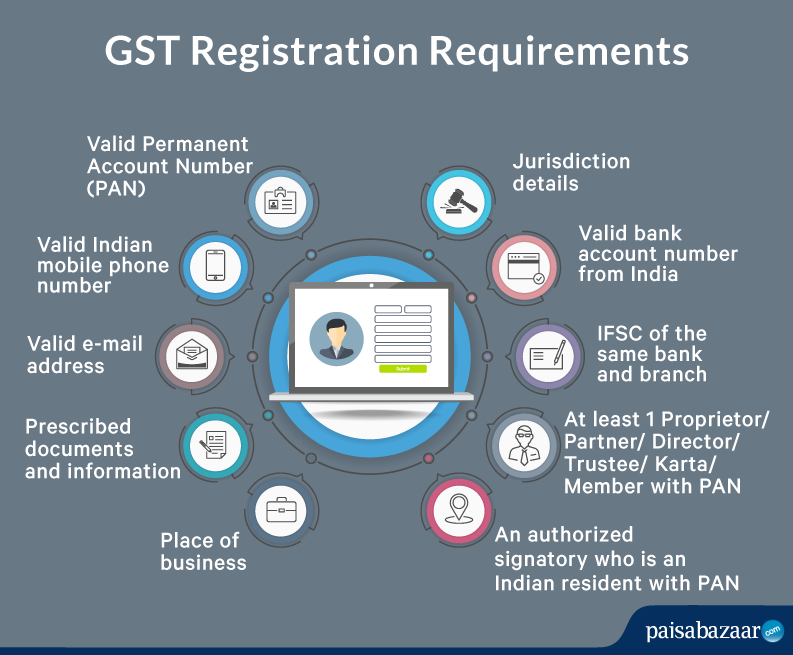From Beginning To End: The Ultimate Roadmap to GST Enrollment for Companies Seeking Financial Security
Browsing the complexities of Goods and Provider Tax Obligation (GST) registration is a critical action for businesses striving for monetary security. Damaging down the roadmap into convenient actions can streamline the enrollment trip for organizations looking to boost their monetary standing.
Recognizing GST Essentials
Delving into the basic concepts of Goods and Solutions Tax Obligation (GST) is crucial for obtaining a detailed understanding of its effects on businesses and the economic climate. GST is a value-added tax imposed on a lot of items and services for domestic usage. It has actually changed numerous indirect tax obligations that existed in the pre-GST period, improving the tax structure and improving simplicity of doing company in India. Under the GST system, both items and services are strained at a details rate, which is identified based on their category. Businesses are needed to sign up for GST if their annual turnover goes beyond the threshold restriction set by the government. Input Tax Obligation Credit History (ITC) is a considerable feature of GST, permitting companies to assert credit rating for taxes paid on inputs, decreasing the overall tax concern. Comprehending the basics of GST is important for organizations to abide by tax guidelines, handle their financial resources efficiently, and add to the country's financial development by taking part in a clear tax system.
Eligibility Requirements for Registration
To register for GST, organizations should satisfy details eligibility standards developed by the federal government. The primary eligibility requirement is that any kind of service included in the supply of products or solutions with an annual aggregate turn over over the threshold restriction established by the authorities have to sign up for GST. Since the existing policies, the threshold limitation for GST registration is a yearly accumulation turnover of 40 lakhs for services operating within a state, other than for special category states where the limit is 20 lakhs. Furthermore, certain organizations are needed to register for GST irrespective of their turnover, such as interstate distributors, casual taxed persons, and businesses reliant pay tax under the reverse cost device. It is important for companies to thoroughly assess their turn over and deal types to identify their GST registration commitments properly. Failing to register for GST when eligible can lead to penalties and legal consequences, making it important for businesses to stick to the defined eligibility criteria.
Papers Needed for Enrollment
Having met the eligibility standards for GST enrollment, companies need to currently their explanation ensure they have the requisite documents in place to wage the enrollment process effectively. The documents required for GST registration commonly consist of proof of service constitution, such as collaboration act, registration certification, or incorporation certificate for various types of organizations. Furthermore, businesses need to offer records developing the major business, such as a rental arrangement or electrical energy expense. PAN card of business, as well as the identification and address proof of promoters/partners/directors, are important for verification purposes. Checking account statements, together with terminated cheques or a duplicate of the financial institution passbook, are needed to verify the financial information supplied during registration. In addition, businesses have to have electronic trademarks ready for the accredited signature. Making sure all these records are arranged and readily available will speed up the GST registration process, making it possible for businesses to abide by tax obligation laws seamlessly.
Step-by-Step Registration Refine
Beginning the GST enrollment process entails a series of organized steps to guarantee a compliant and smooth registration for businesses. The very first step is to go to the GST site and fill out the enrollment kind with accurate details of the organization entity. Following this, the applicant obtains a Temporary Reference Number (TRN) which is made use of to pop over to these guys return to the application process if it's not completed in one go.
Next, all required records as per the list offered by the GST portal demand to be posted. These papers usually include proof of service enrollment, identification and address proofs of promoters, financial statements, and company entity's PAN card.

Post-Registration Conformity Standards

Conclusion
To conclude, organizations looking for financial go to this website security needs to understand the essentials of GST, meet eligibility standards, gather needed papers, adhere to the step-by-step enrollment process, and conform with post-registration guidelines - Best GST registration services in Singapore. By adhering to these steps, organizations can make sure compliance with tax policies and preserve financial security over time
Furthermore, specific services are needed to register for GST regardless of their turn over, such as interstate providers, informal taxed individuals, and organizations accountable to pay tax obligation under the reverse cost mechanism.Having actually satisfied the qualification requirements for GST registration, companies have to currently ensure they have the requisite papers in location to continue with the enrollment process efficiently. The documents needed for GST enrollment typically include proof of company constitution, such as collaboration deed, enrollment certificate, or unification certificate for various kinds of businesses. In addition, services need to supply papers developing the major location of company, such as a rental contract or electricity bill.Commencing the GST enrollment process entails a collection of structured steps to make certain a smooth and compliant registration for companies.